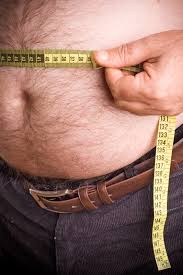Some reasons why quitters ussually gain weight.
Smoking burns calories.
Smoking increases your metabolism and elevates your heart rate. when you quit, you burn about 100 fewer calories a day. It can take weeks or months for your metabolism to rebound after you quit smoking.
Smoking suppresses hunger.
Nicotine raises your blood-sugar level slightly and suppresses appetite. Until your metabolism adjusts, expect to gain about a pound a week.
Smoking makes you feel good.
Nicotine increases the levels of dopamine (a chemical associated with pleasure) in the brain. High-calorie foods (candy, cookies) and alcohol produce much the same effect. So after quitting, you may be tempted to replace cigarettes with them. This mechanism may explain why bupropion (Zyban), an antidepressant that works on the brain’s dopamine system, has shown to be helpful for smoking cessation.
Smoking gives you something to do with your hands and mouth.
So does eating. Eating makes you feel less deprived by your decision to quit.
Foods have better taste and smell.
Smoking dulls your taste buds. After you quit smoking, food begins to taste and smell better, so you may find yourself wanting to eat more.
Smoking is reliable when other things are not.
People use both cigarettes and food as a way to deal with boredom or stress, as a reward, or as a crutch in social situations.
How to control your weight after quitting.
Conquer your smoking triggers.
For example, if you were used to smoking after a meal, get up from the table and brush your teeth instead.
Sidetrack that oral fixation.
Experts recommend chewing celery, carrots, sugar-free gum or candies, or playing with a straw or toothpick.
Try cognitive-behavioral therapy.
This can help you focus on taking care of yourself—quitting first and then working on weight control.
Smaller portion but frequent.
It will increase your metabolism and avoid getting so hungry that you overeat.
Protein and fiber.
Eat high-protein, high-fiber foods because they fill up your stomach more.
Exercise.
Instead of going to smoke or grab a high callories snack, take a walk or go to the gym. Keep in mind that moderate exercise, such as a walk during lunch, will actually decrease your appetite, because as you exercise fat breaks down and enters your bloodstream. The extra muscle mass you gain by exercising will also help increase your metabolism, not to mention that exercise helps you deal with stress, boredom, and tension.
Source: How to Quit Smoking Without Gaining (Much) Weight
Smoking burns calories.
Smoking increases your metabolism and elevates your heart rate. when you quit, you burn about 100 fewer calories a day. It can take weeks or months for your metabolism to rebound after you quit smoking.
Smoking suppresses hunger.
Nicotine raises your blood-sugar level slightly and suppresses appetite. Until your metabolism adjusts, expect to gain about a pound a week.
Smoking makes you feel good.
Nicotine increases the levels of dopamine (a chemical associated with pleasure) in the brain. High-calorie foods (candy, cookies) and alcohol produce much the same effect. So after quitting, you may be tempted to replace cigarettes with them. This mechanism may explain why bupropion (Zyban), an antidepressant that works on the brain’s dopamine system, has shown to be helpful for smoking cessation.
Smoking gives you something to do with your hands and mouth.
So does eating. Eating makes you feel less deprived by your decision to quit.
Foods have better taste and smell.
Smoking dulls your taste buds. After you quit smoking, food begins to taste and smell better, so you may find yourself wanting to eat more.
Smoking is reliable when other things are not.
People use both cigarettes and food as a way to deal with boredom or stress, as a reward, or as a crutch in social situations.
How to control your weight after quitting.
Conquer your smoking triggers.
For example, if you were used to smoking after a meal, get up from the table and brush your teeth instead.
Sidetrack that oral fixation.
Experts recommend chewing celery, carrots, sugar-free gum or candies, or playing with a straw or toothpick.
Try cognitive-behavioral therapy.
This can help you focus on taking care of yourself—quitting first and then working on weight control.
Smaller portion but frequent.
It will increase your metabolism and avoid getting so hungry that you overeat.
Protein and fiber.
Eat high-protein, high-fiber foods because they fill up your stomach more.
Exercise.
Instead of going to smoke or grab a high callories snack, take a walk or go to the gym. Keep in mind that moderate exercise, such as a walk during lunch, will actually decrease your appetite, because as you exercise fat breaks down and enters your bloodstream. The extra muscle mass you gain by exercising will also help increase your metabolism, not to mention that exercise helps you deal with stress, boredom, and tension.
Source: How to Quit Smoking Without Gaining (Much) Weight





 Quit Smoking Without Gaining Too Much Weight
Quit Smoking Without Gaining Too Much Weight


0 Response to "Quit Smoking Without Gaining Too Much Weight"
Post a Comment